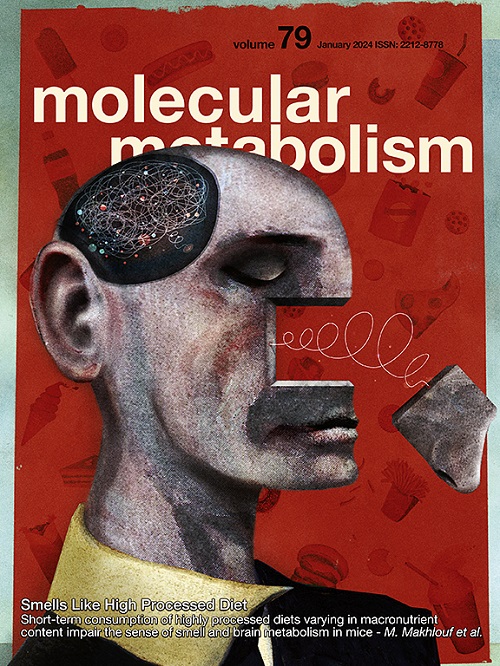Endothelial autophagy-related gene 7 contributes to high fat diet-induced obesity
IF 6.6
2区 医学
Q1 ENDOCRINOLOGY & METABOLISM
引用次数: 0
Abstract
Objective
Obesity-associated metabolic dysfunction is a major public health concern worldwide. Endothelial dysfunction is a hallmark of metabolic dysfunction, and endothelial cells affect metabolic functions. Because autophagy-related gene 7 (ATG7) is involved in various cellular physiology, we investigated the roles of endothelial cell-ATG7 (EC-ATG7) on high-fat diet-induced obesity and its related metabolic dysfunction.
Methods
We generated an endothelial-specific Atg7 knock-out mouse by breeding Atg7flox/flox mouse with the Chd5-Cre mouse, and investigated the metabolic phenotypes associated with high-fat diet (HFD)-induced obesity. Body weight, food intake, glucose tolerance, insulin sensitivity, and liver fat accumulation were measured in endothelial Atg7 deficient (Atg7ΔEnd) and control mice (Atg7f/f). Adipose tissue inflammation was assessed by measuring the expression of pro-inflammatory genes. Furthermore, we performed indirect calorimetry and examined the insulin signaling pathway molecules.
Results
We found that deletion of EC-Atg7 ameliorated HFD-induced weight gain, fatty liver, and adipocyte hypertrophy and inflammatory response in adipose tissue, and improved insulin sensitivity without changing glucose tolerance. These metabolic effects seem to be due to the reduced food intake because there were no differences in energy expenditure, energy excretion to feces, and physical activity. Interestingly, the deletion of EC-Atg7 protected from HFD-induced vascular rarefaction, and the knock-down of Atg7 in endothelial cells protected from fatty acid-induced cell death.
Conclusions
Our results suggest that EC-Atg7 deletion ameliorates HFD-induced obesity and its related metabolic dysfunction, such as insulin resistance and fatty liver by attenuating appetite and vascular rarefaction. The EC-Atg7 deletion may protect the endothelial cells from lipotoxicity and impaired angiogenesis, which preserves the endothelial function in metabolic tissues. These findings may have implications for developing new therapeutic strategies for preventing and treating obesity and its associated health risks.
内皮细胞自噬相关基因7与高脂饮食诱导的肥胖有关
目的:肥胖相关的代谢功能障碍是全世界关注的主要公共卫生问题。内皮功能障碍是代谢功能障碍的标志,内皮细胞影响代谢功能。由于自噬相关基因7 (ATG7)参与多种细胞生理,我们研究了内皮细胞ATG7 (EC-ATG7)在高脂饮食诱导的肥胖及其相关代谢功能障碍中的作用。方法:我们将Atg7flox/flox小鼠与Chd5-Cre小鼠杂交,产生内皮特异性Atg7敲除小鼠,并研究与高脂饮食(HFD)诱导的肥胖相关的代谢表型。测量了内皮at7f缺陷小鼠(Atg7ΔEnd)和对照小鼠(Atg7f/f)的体重、食物摄入量、葡萄糖耐量、胰岛素敏感性和肝脏脂肪积累。通过测量促炎基因的表达来评估脂肪组织炎症。此外,我们进行了间接量热法并检测了胰岛素信号通路分子。结果:我们发现,EC-Atg7的缺失可以改善hfd诱导的体重增加、脂肪肝、脂肪细胞肥大和脂肪组织的炎症反应,并在不改变葡萄糖耐量的情况下改善胰岛素敏感性。这些代谢影响似乎是由于食物摄入量的减少,因为在能量消耗、能量排泄到粪便和身体活动方面没有差异。有趣的是,EC-Atg7的缺失可以防止hfd诱导的血管稀薄,而内皮细胞中Atg7的敲低可以防止脂肪酸诱导的细胞死亡。结论:我们的研究结果表明,EC-Atg7的缺失可以通过降低食欲和血管稀疏来改善hfd诱导的肥胖及其相关的代谢功能障碍,如胰岛素抵抗和脂肪肝。EC-Atg7的缺失可以保护内皮细胞免受脂肪毒性和血管生成损伤,从而保持代谢组织的内皮功能。这些发现可能对开发预防和治疗肥胖及其相关健康风险的新治疗策略具有启示意义。
本文章由计算机程序翻译,如有差异,请以英文原文为准。
求助全文
约1分钟内获得全文
求助全文
来源期刊

Molecular Metabolism
ENDOCRINOLOGY & METABOLISM-
CiteScore
14.50
自引率
2.50%
发文量
219
审稿时长
43 days
期刊介绍:
Molecular Metabolism is a leading journal dedicated to sharing groundbreaking discoveries in the field of energy homeostasis and the underlying factors of metabolic disorders. These disorders include obesity, diabetes, cardiovascular disease, and cancer. Our journal focuses on publishing research driven by hypotheses and conducted to the highest standards, aiming to provide a mechanistic understanding of energy homeostasis-related behavior, physiology, and dysfunction.
We promote interdisciplinary science, covering a broad range of approaches from molecules to humans throughout the lifespan. Our goal is to contribute to transformative research in metabolism, which has the potential to revolutionize the field. By enabling progress in the prognosis, prevention, and ultimately the cure of metabolic disorders and their long-term complications, our journal seeks to better the future of health and well-being.
 求助内容:
求助内容: 应助结果提醒方式:
应助结果提醒方式:


